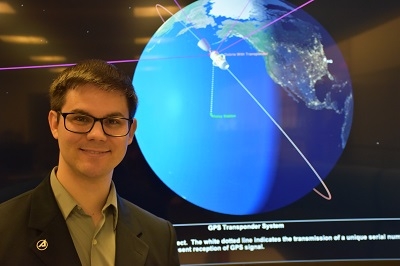Name: Andrew

Education: Doctorate in mechanical engineering from Lehigh University
Master's degree in physics from Lehigh University
Bachelor's degrees in physics and economics from Moravian College
What are you working on at Aerospace?
I work on orbital debris, space traffic management, and early orbit operations.
What is a typical day like for you at Aerospace?
There is a lot of variety in my schedule. Some days I’m working on a multi-month-long study for one of my customers, while other days I could be working on a quick-turn analysis to plan maneuvers that a spacecraft will execute later in the day. Sometimes my day is interrupted by an unexpected event occurring in space. For example, if two satellites collide in space, I would be called by the Combined Space Operations Center (CSpOC) to create an analysis of the debris cloud that was produced by the collision. In a matter of hours, I’m expected to create a report that assesses the risk that debris cloud poses to other valuable satellites flying in its vicinity.
What’s the most exciting part of your job?
By far it is the unexpected events that occur in space. I could go into the office expecting a quiet, low-key day, and within an hour be thrown into the middle of a high-profile event that desperately requires my analysis work. Those are the types of events that leave a big impression and help you realize what a special job this is.
Tell us one thing nobody would guess about you.
I once was an avid archer. I competed in several archery leagues from middle school into my early college years.
What excites you about the aerospace industry and space today?
The rapid change is what excites me the most. Commercial crew, a return to the moon, new launch vehicles, the proliferation of cubesats, the introduction of mega-constellations, and the contested space environment are all examples of rapid change in this industry. Of course, these changes also represent an opportunity for me to contribute my technical talent towards solving new and difficult problems as the arise. I think this opportunity to make substantial and positive technical contributions to the United States and the world is what excites me the most.
Would you be willing to colonize Mars if it meant never returning to Earth?
A one-way ticket to Mars is probably a bit of a stretch for me. However, I would not hesitate to participate in a short two year visit for the sake of exploration. Personally, I’m much more enthusiastic for the prospects of establishing substantial infrastructure (both human and robotic) on the moon. I believe the moon is often overlooked with a “been there, done that” mentality but a pragmatic view of human exploration/colonization of the solar system should include heavy investments in the moon due to its unparalleled strategic and practical value. What other destination offers such abundant resources with a mere three day journey from Earth?
Ready to join the Aerospace team? Visit our careers page.

